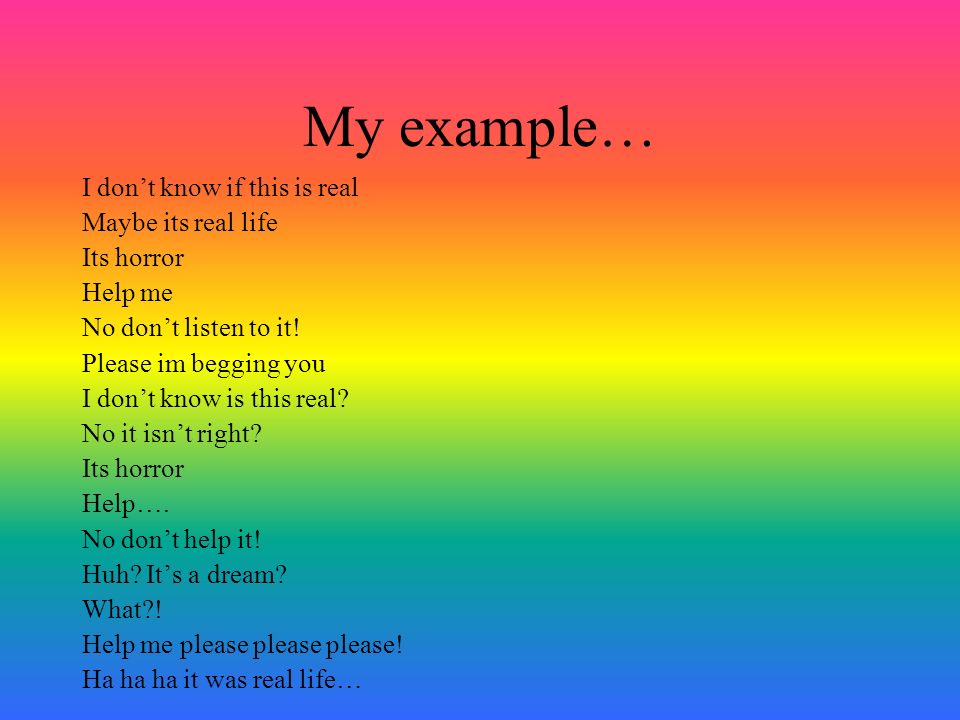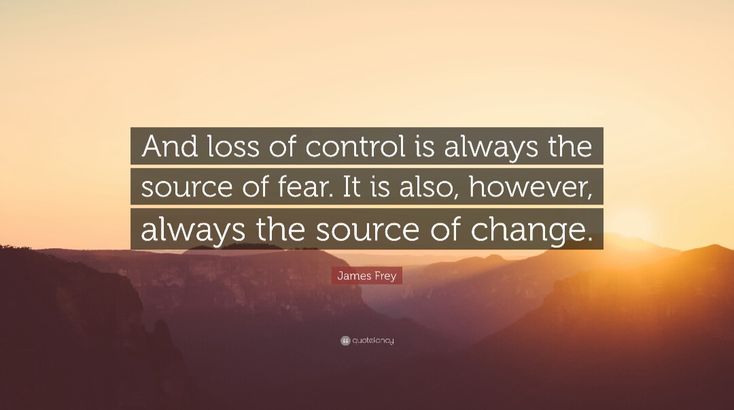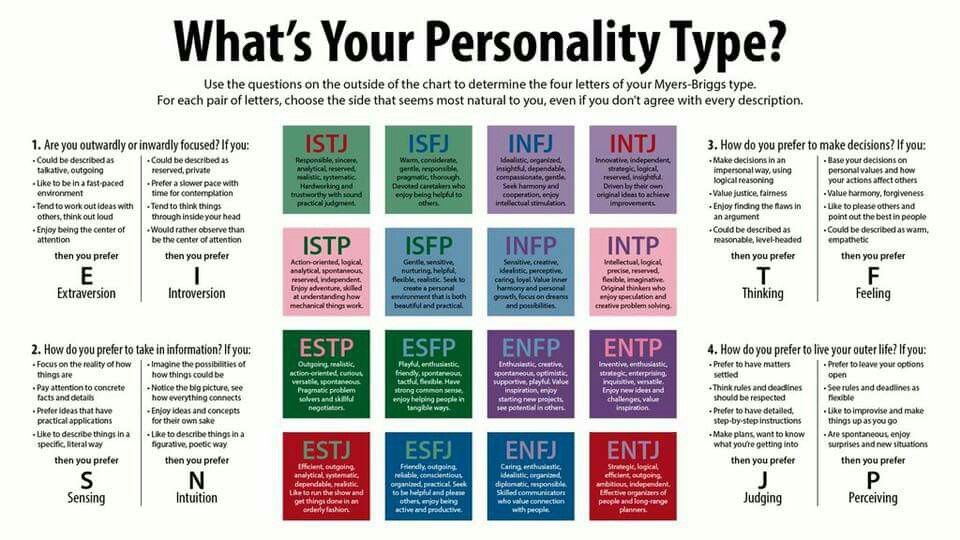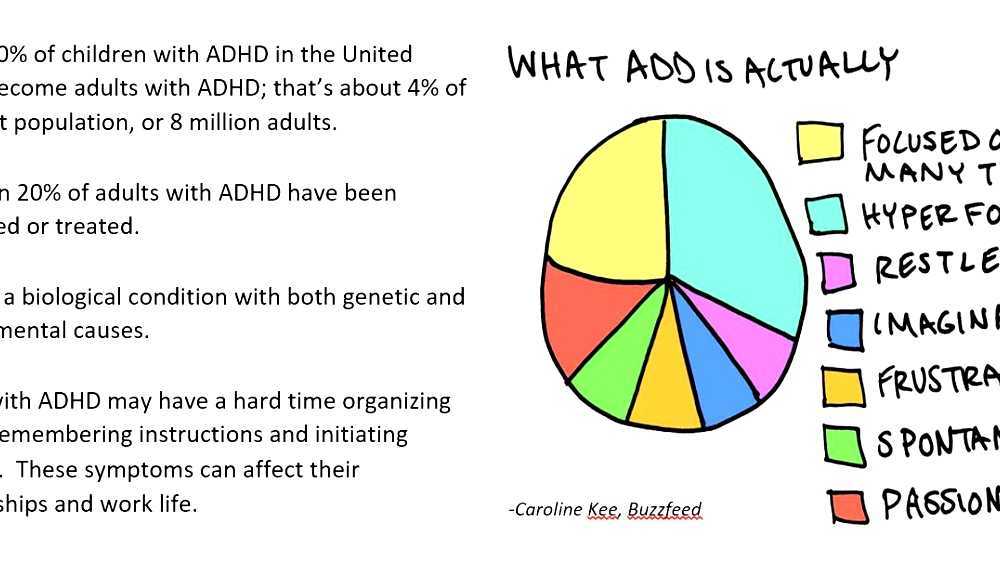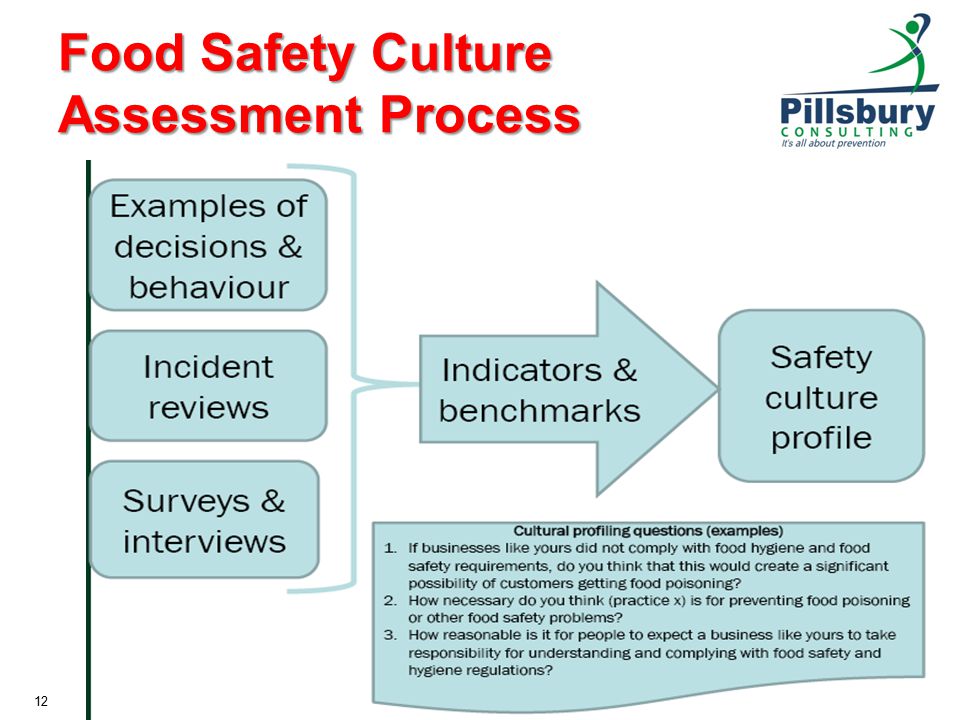Autism traits test
Online Test for Adult Autism
Share this page
Question 1
I prefer to do things on my own, rather than with others.
- Definitely Agree
- Slightly Agree
- Slightly disagree
- Definitely disagree
Question 2
I prefer doing things the same way - for instance my morning routine or trip to the supermarket
- Definitely Agree
- Slightly Agree
- Slightly disagree
- Definitely disagree
Question 3
I find myself becoming strongly absorbed in something – even obsessional
- Definitely Agree
- Slightly Agree
- Slightly disagree
- Definitely disagree
Question 4
I am very sensitive to noise and will wear earplugs or cover my ears in certain situations
- Definitely Agree
- Slightly Agree
- Slightly disagree
- Definitely disagree
Question 5
Sometimes people say I am being rude, even though I think I am being polite.
- Definitely Agree
- Slightly Agree
- Slightly disagree
- Definitely disagree
Question 6
I find it easy to imagine what characters from a book might look like.
- Definitely Agree
- Slightly Agree
- Slightly disagree
- Definitely disagree
Question 7
I find it easy to talk in groups of people
- Definitely Agree
- Slightly Agree
- Slightly disagree
- Definitely disagree
Question 8
I am more interested in finding out about ‘things’ than people
- Definitely Agree
- Slightly Agree
- Slightly disagree
- Definitely disagree
Question 9
I find numbers, dates and strings of information fascinating
- Definitely Agree
- Slightly Agree
- Slightly disagree
- Definitely disagree
Question 10
I prefer non-fiction books and films to fiction
- Definitely Agree
- Slightly Agree
- Slightly disagree
- Definitely disagree
Question 11
I find it upsetting if my daily routine is upset or changed
- Definitely Agree
- Slightly Agree
- Slightly disagree
- Definitely disagree
Question 12
It’s difficult for me to understand other people’s facial expression and body language
- Definitely Agree
- Slightly Agree
- Slightly disagree
- Definitely disagree
Question 13
I don’t have any problems making small talk with new people
- Definitely Agree
- Slightly Agree
- Slightly disagree
- Definitely disagree
Question 14
I notice very small changes in a person’s appearance
- Definitely Agree
- Slightly Agree
- Slightly disagree
- Definitely disagree
Question 15
When I was young I used to play lots of ‘let’s pretend’ or imaginary games
- Definitely Agree
- Slightly Agree
- Slightly disagree
- Definitely disagree
Question 16
I like collecting information about things I am interested in
- Definitely Agree
- Slightly Agree
- Slightly disagree
- Definitely disagree
Question 17
I like meeting new people
- Definitely Agree
- Slightly Agree
- Slightly disagree
- Definitely disagree
Question 18
People close to me say I talk about the same things repeatedly
- Definitely Agree
- Slightly Agree
- Slightly disagree
- Definitely disagree
Question 19
I find it easy to work out what people are thinking or feeling just by looking at their facial expressions
- Definitely Agree
- Slightly Agree
- Slightly disagree
- Definitely disagree
Question 20
New social situations make me feel anxious
- Definitely Agree
- Slightly Agree
- Slightly disagree
- Definitely disagree
Question 21
It’s important to me to carefully plan any activities I am going to do
- Definitely Agree
- Slightly Agree
- Slightly disagree
- Definitely disagree
Question 22
I find it hard to work out what people’s intentions are
- Definitely Agree
- Slightly Agree
- Slightly disagree
- Definitely disagree
Question 23
I would find it really hard to play imaginary games with children
- Definitely Agree
- Slightly Agree
- Slightly disagree
- Definitely disagree
Question 24
I am a good diplomat and can help ease difficult social or work situations
- Definitely Agree
- Slightly Agree
- Slightly disagree
- Definitely disagree
Question 25
I am often the last person to understand a joke
- Definitely Agree
- Slightly Agree
- Slightly disagree
- Definitely disagree
Question 26
I like doing things spontaneously
- Definitely Agree
- Slightly Agree
- Slightly disagree
- Definitely disagree
Question 27
If I am interrupted doing something I find it hard to get back to what I was doing before hand
- Definitely Agree
- Slightly Agree
- Slightly disagree
- Definitely disagree
Question 28
I notice patterns in things all the time
- Definitely Agree
- Slightly Agree
- Slightly disagree
- Definitely disagree
Question 29
I have some very strong interests and get upset if I can’t pursue them
- Definitely Agree
- Slightly Agree
- Slightly disagree
- Definitely disagree
Question 30
I can tell if someone I am talking to is getting bored
- Definitely Agree
- Slightly Agree
- Slightly disagree
- Definitely disagree
Question 1 of 30
When answering the above questions please consider how much the statements apply to you.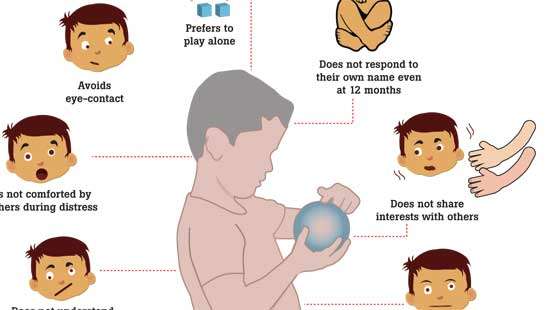
The above 30 questions may be useful to understand if you are experiencing some of the common behaviours and thoughts associated with being on the Autistic Spectrum. The questions are based on an evidence-based screening tool – the Autism Spectrum Quotient – but are indicative only and do not form a formal diagnosis.
References: S. Baron-Cohen, S. Wheelwright, R. Skinner, J. Martin and E. Clubley, (2001) The Autism Spectrum Quotient (AQ) : Evidence from Asperger Syndrome/High Functioning Autism, Males and Females, Scientists and Mathematicians Journal of Autism and Developmental Disorders 31:5-17
Need to talk:
0203 326 9160 0203 326 9160
Speak with a member of our friendly staff in complete confidence and arrange a consultation, either face-to-face or online.
Take another test
View all tests
We have online mental health quizzes for many conditions including ADHD, autism, anxiety, depression, PTSD, and more. Each one should take no longer than five minutes.
Autism Quiz: Do I Have Autism?
Autism Quiz: Do I Have Autism? | Psych Central- Conditions
- Featured
- Addictions
- Anxiety Disorder
- ADHD
- Bipolar Disorder
- Depression
- PTSD
- Schizophrenia
- Articles
- Adjustment Disorder
- Agoraphobia
- Borderline Personality Disorder
- Childhood ADHD
- Dissociative Identity Disorder
- Narcissistic Personality Disorder
- Narcolepsy
- Oppositional Defiant Disorder
- Panic Attack
- Postpartum Depression
- Schizoaffective Disorder
- Seasonal Affective Disorder
- Sex Addiction
- Specific Phobias
- Teenage Depression
- Trauma
- Featured
- Discover
- Wellness Topics
- Black Mental Health
- Grief
- Emotional Health
- Sex & Relationships
- Trauma
- Understanding Therapy
- Workplace Mental Health
- Original Series
- My Life with OCD
- Caregivers Chronicles
- Empathy at Work
- Sex, Love & All of the Above
- Parent Central
- Mindful Moment
- News & Events
- Mental Health News
- COVID-19
- Live Town Hall: Mental Health in Focus
- Podcasts
- Inside Mental Health
- Inside Schizophrenia
- Inside Bipolar
- Wellness Topics
- Quizzes
- Conditions
- ADHD Symptoms Quiz
- Anxiety Symptoms Quiz
- Autism Quiz: Family & Friends
- Autism Symptoms Quiz
- Bipolar Disorder Quiz
- Borderline Personality Test
- Childhood ADHD Quiz
- Depression Symptoms Quiz
- Eating Disorder Quiz
- Narcissim Symptoms Test
- OCD Symptoms Quiz
- Psychopathy Test
- PTSD Symptoms Quiz
- Schizophrenia Quiz
- Lifestyle
- Attachment Style Quiz
- Career Test
- Do I Need Therapy Quiz?
- Domestic Violence Screening Quiz
- Emotional Type Quiz
- Loneliness Quiz
- Parenting Style Quiz
- Personality Test
- Relationship Quiz
- Stress Test
- What's Your Sleep Like?
- Conditions
- Resources
- Treatment & Support
- Find Support
- Suicide Prevention
- Drugs & Medications
- Find a Therapist
- Treatment & Support
Medically reviewed by Jeffrey Ditzell, DO — By Christina Ward — Updated on April 11, 2021
Autism spectrum disorder (ASD) is a neurodevelopmental disorder that affects the way a person thinks, behaves, and communicates.
While children are typically screened for autism symptoms as early as 18 months, it can be diagnosed later in older children, adolescents, and even adults.
This brief, time-saving test is designed for anyone who thinks they might benefit from an autism screening or evaluation.
The items below will help you determine whether you may need an in-depth evaluation including screening tools, parental or family insight, and clinical observations.
A mental health professional can also help figure out if your symptoms might be a sign of another mental health condition and recommend treatment if needed.
This online screening is not a definitive tool. It will not conclusively guarantee that you have autism.
However, it will measure if you have any autism-related traits, based on your own self-assessment.
Only a trained medical professional, such as a doctor or mental health professional, can help you determine the next best steps for you.
This free autism quiz was adapted from the Autism Spectrum Screening Questionnaire (ASSQ) designed to screen for the possibility of autism spectrum disorder (ASD).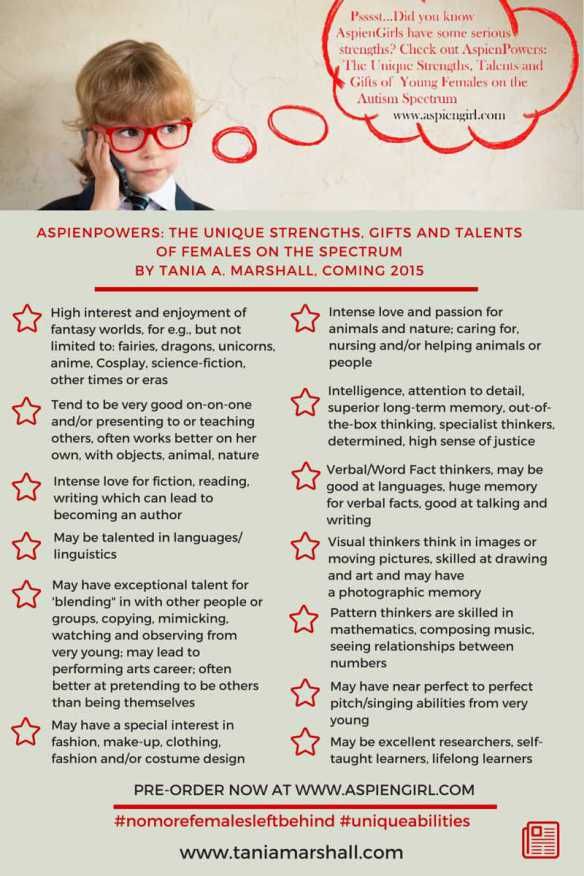 This is not a diagnostic tool and should be considered for personal use only. An accurate diagnosis can be made only through a clinical evaluation. If you think you might have ASD, consider speaking with a primary care doctor, psychiatrist or another mental health professional. They can perform a clinical evaluation that includes screening tools, parental or family insight, and clinical observations to arrive at the most accurate diagnosis.
This is not a diagnostic tool and should be considered for personal use only. An accurate diagnosis can be made only through a clinical evaluation. If you think you might have ASD, consider speaking with a primary care doctor, psychiatrist or another mental health professional. They can perform a clinical evaluation that includes screening tools, parental or family insight, and clinical observations to arrive at the most accurate diagnosis.
Instructions
The items below refer to your preferences and behaviors over the course of your life. For the results of this quiz to be most accurate, try to be as honest as possible in your responses.
This online screening is not a diagnostic tool. Only a trained medical professional, like a doctor or mental health professional, can help you determine the next best steps for you.
Ready to start therapy? Our Find a Therapist resource may help.
Last medically reviewed on April 11, 2021
5 sourcescollapsed
- Baron-Cohen B, et al.
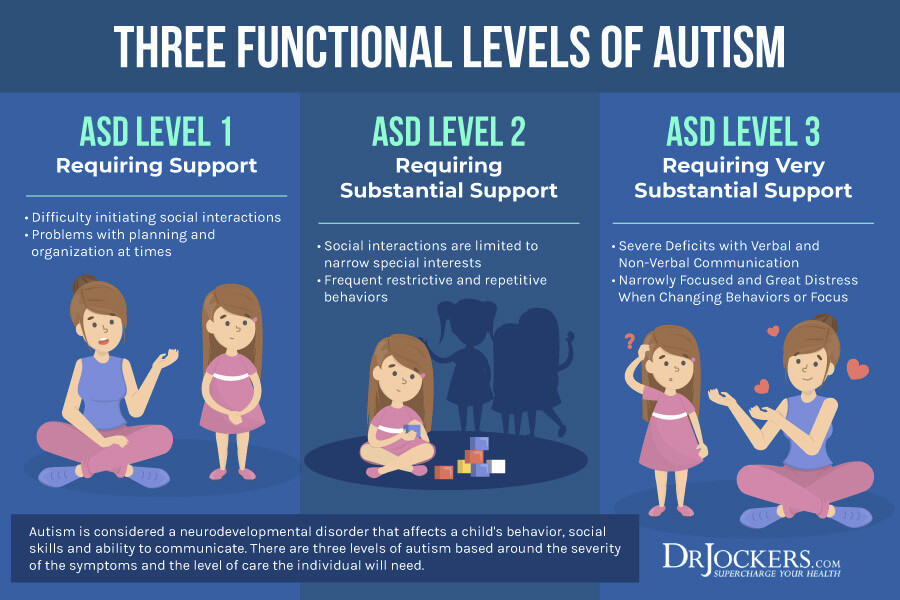 (2001). The autism-spectrum quotient (AQ): Evidence from Asperger syndrome/high-functioning autism, males and females, scientists and mathematicians.
(2001). The autism-spectrum quotient (AQ): Evidence from Asperger syndrome/high-functioning autism, males and females, scientists and mathematicians.
link.springer.com/article/10.1023%2FA%3A1005653411471 - Barrett SL, et al. (2015). The adult repetitive behaviours questionnaire-2 (RBQ-2A): A self-report measure of restricted and repetitive behaviours.
ncbi.nlm.nih.gov/pmc/articles/PMC4608982/ - Dell'Osso L, et al. (2017). Adult autism subthreshold spectrum (AdAS Spectrum): Validation of a questionnaire investigating subthreshold autism spectrum.
sciencedirect.com/science/article/abs/pii/S0010440X1630339X?via%3Dihub - Erikkson JM, et al. (2013). RAADS-14 Screen: Validity of a screening tool for autism spectrum disorder in an adult psychiatric population.
molecularautism.biomedcentral.com/articles/10.1186/2040-2392-4-49 - Woodbury-Smith MR, et al. (2005). Screening adults for Asperger Syndrome using the AQ: A preliminary study of its diagnostic validity in clinical practice.
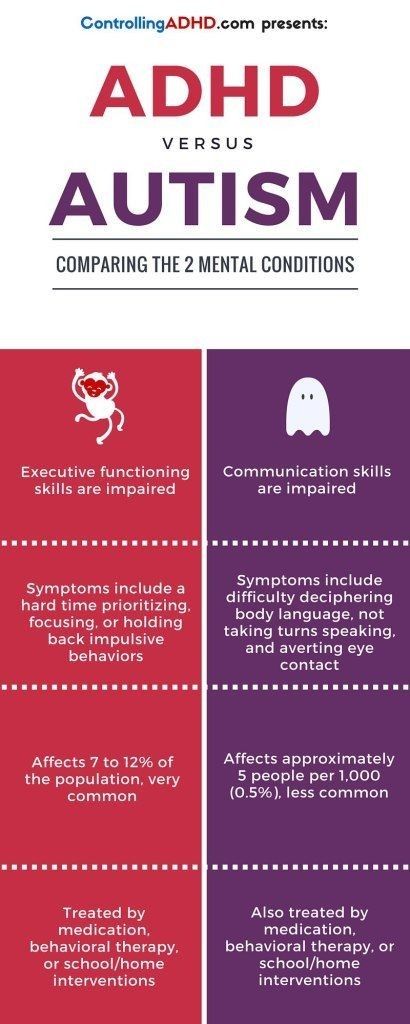
link.springer.com/article/10.1007/s10803-005-3300-7
FEEDBACK:
Medically reviewed by Jeffrey Ditzell, DO — By Christina Ward — Updated on April 11, 2021
RELATED
What Are the Symptoms of Autism Spectrum Disorder?
What Disorders Are Related to Autism?
Growing Up Autistic: How Do I Make the Leap to Adulthood?
Asperger’s vs. Autism: What Exactly Is the Difference?
How Is Autism Diagnosed?
Read this next
What Are the Symptoms of Autism Spectrum Disorder?
Medically reviewed by Timothy J. Legg, PhD, PsyD, CRNP, ACRN, CPH
Autism symptoms are actually differences in sensory, communication, and behavior patterns. Here's why.
READ MORE
What Disorders Are Related to Autism?
Medically reviewed by Nathan Greene, PsyD
If you're autistic, it's fairly common to also live with another medical, neurodevelopmental, or genetic condition.
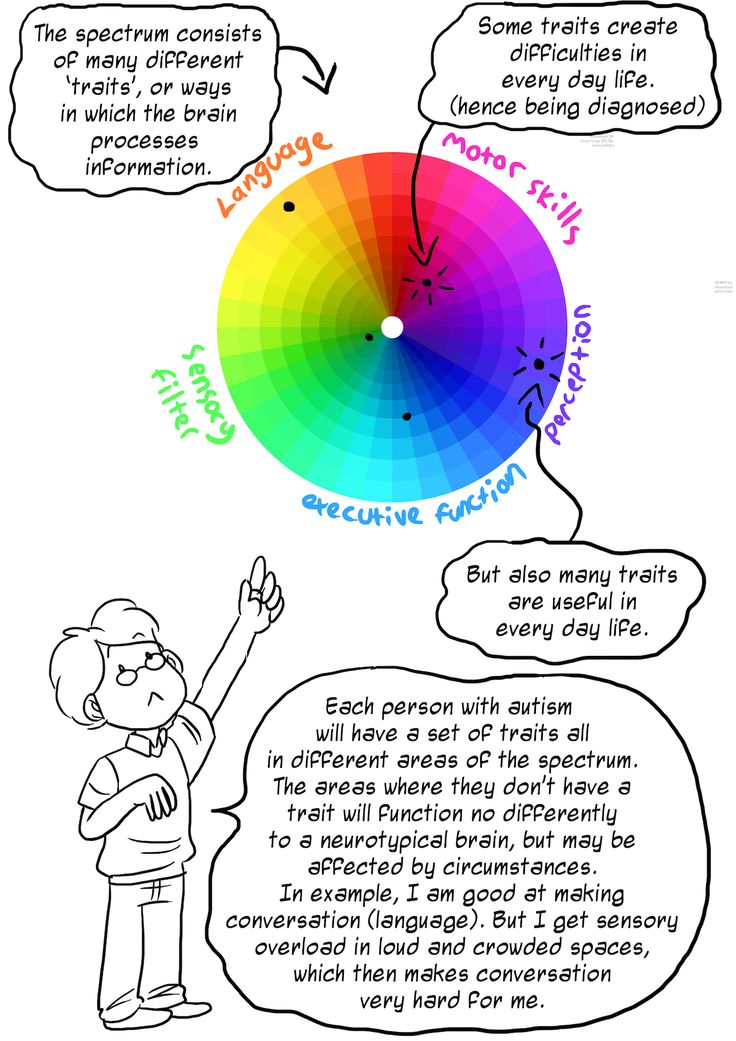 Learn about autism-related…
Learn about autism-related…READ MORE
Growing Up Autistic: How Do I Make the Leap to Adulthood?
Medically reviewed by Jeffrey Ditzell, DO
Each autistic adult is different. Learn how you can manage school, work, and more with whichever level of support works best for you.
READ MORE
Asperger’s vs. Autism: What Exactly Is the Difference?
Medically reviewed by Akilah Reynolds, PhD
Asperger's syndrome and autism (ASD) are different diagnoses, but if you've guessed that there's a lot of overlap, you're also right. You can learn…
READ MORE
How Is Autism Diagnosed?
Medically reviewed by Alexander Klein, PsyD
Autism is diagnosed based on shared behaviors and ways of communicating. But with that said, every person with autism is different.
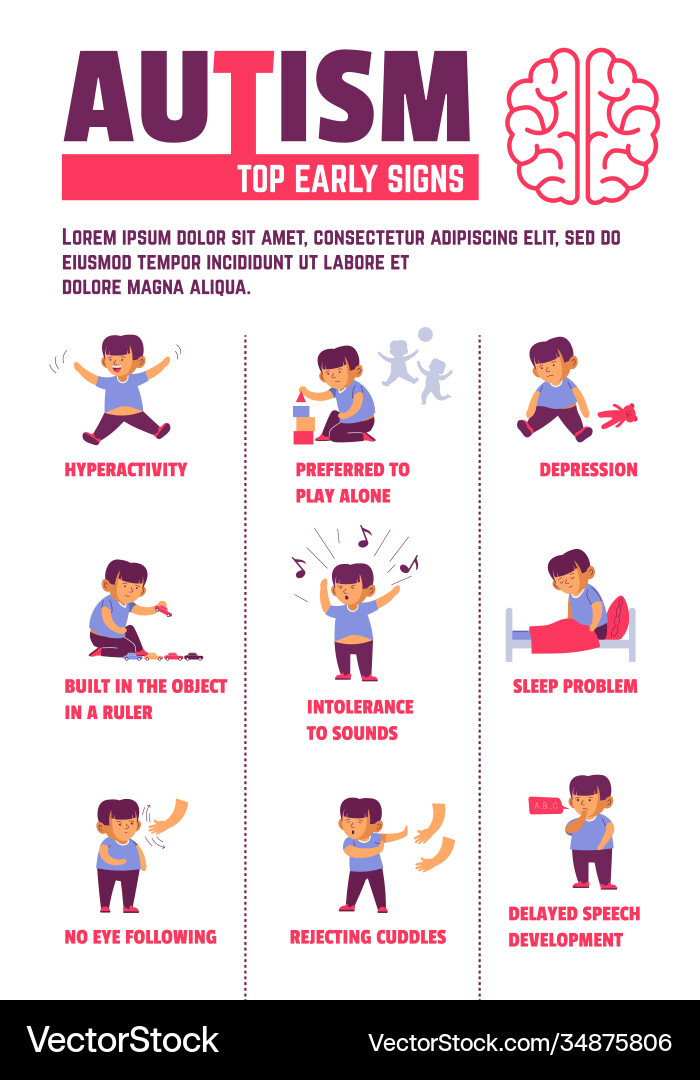 Learn about…
Learn about…READ MORE
What to Know About Nonspeaking Autism
Autistic people who don't speak can still communicate in many other ways. We look at the signs, causes, and other communication options.
READ MORE
Are There Differences Between Autistic Boys and Girls?
Boys and girls present autism symptoms differently. Learning the difference may help you understand why girls are often underdiagnosed compared to…
READ MORE
Should You Consider Genetic Testing After An Autism Diagnosis?
Medically reviewed by Karen Richardson Gill, MD, FAAP
Autism has more than one cause. Genetic testing may be able to determine if your child’s autism is genetic, or caused by environmental factors.
READ MORE
Is Autism Preventable?
Factors, like exposure to air pollution, can affect your baby’s chance of being autistic.
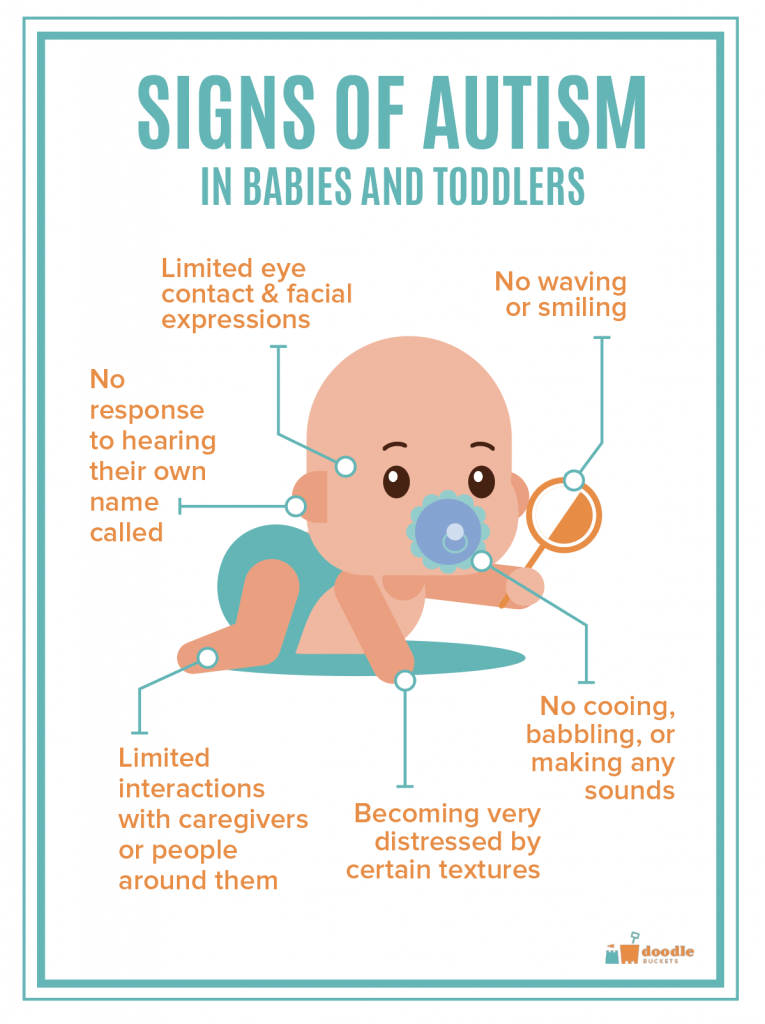 But you can be prepared by spotting the early signs to…
But you can be prepared by spotting the early signs to…READ MORE
How Can You Accommodate Autistic Students in the Classroom? 9 Tips
Autistic children see and interact with the world differently than nonautistic children. Consider these 9 tips to accommodate your students.
READ MORE
Autism Test and Predisposition
Autism is often thought of as purely childhood, acquired, or temporary. However, it is not. Unfortunately, the nature of the disorder is not fully understood, therefore it is impossible to completely cure patients with such a diagnosis using known methods. Symptoms persist even into adulthood and may only improve. If the autistic person does not receive therapy, the prognosis is even worse. A test for autism will show a predisposition to this and similar deviations and give a couple of tips on this.
1. Do you find it difficult to take part in activities that require active imagination and imagery?
No, I have a very good imagination.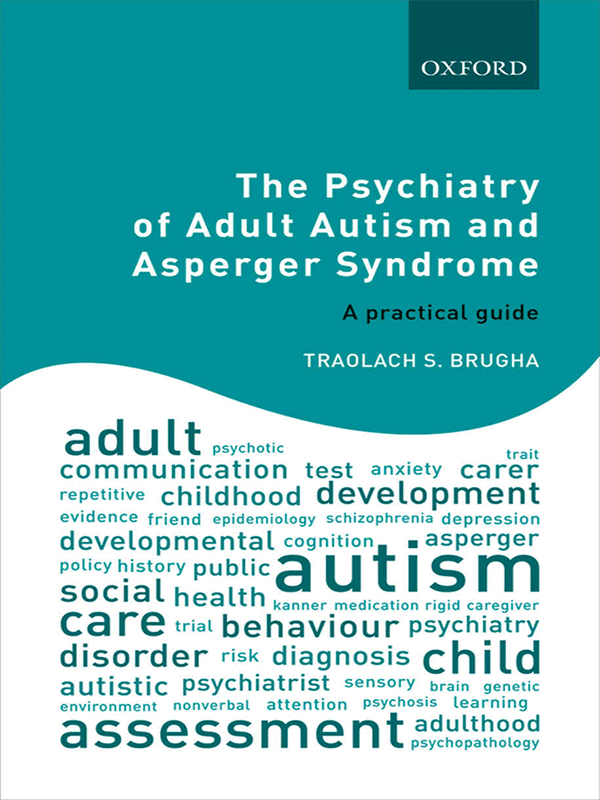
Depends on the type and topic of the task.
Yes, my imagination is weak.
I absolutely cannot do things that require imagery.
2. How well do you express your emotions in front of others?
I always show my emotions openly.
I show my emotions openly only when I am around those closest to me.
I find it difficult to show my emotions, so I avoid it.
I can hardly express or control my emotions.
3. Do you have any activities that you feel you need to constantly repeat in order to stay calm?
No.
Only in stressful situations.
There are such actions, but with effort I can force myself to stop them.
Yes. I can not refuse these actions for a long time and do them every day several times.
4. Do you have a good understanding of other people's body language - their gestures, postures, facial expressions (provided that they do not play and do not restrain the expression of their emotions)?
Yes, I literally read people by their body language.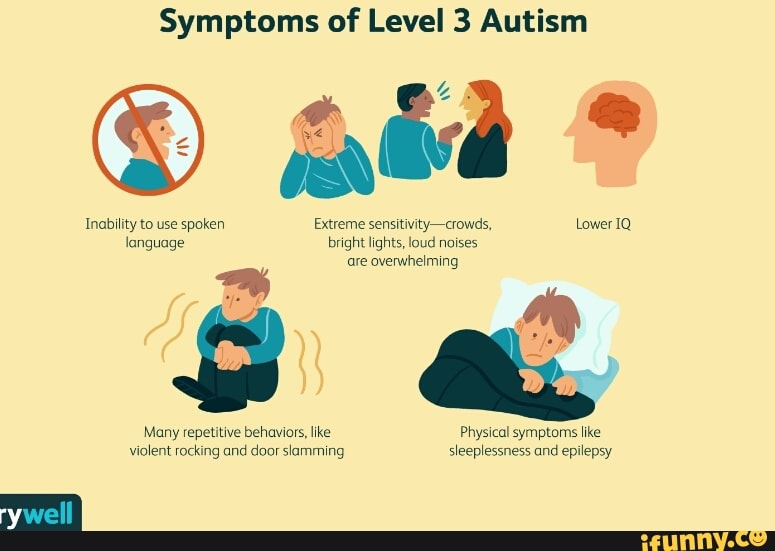
Depends on the person and the degree of his emotional expression.
I don't understand body language well, I often make mistakes in its analysis.
I don't understand body language and have absolutely no idea how other people feel.
5. Do you currently live with your parents?
No, I live alone or with a partner.
Yes, I'm under 25.
Yes, I'm 25-30.
Yes, I'm over 30, or I'm just afraid of living apart from my parents.
6. What is your IQ level?
Over 70.
I don't know for sure.
70 or less.
Less than 50.
7. Can you hold a long conversation on a light general topic?
Yes, no problem.
In general, yes, but I don't like long empty talk.
When how. It happens that I cope well with this, but sometimes even simple long conversations are unusually difficult for me.
No, even simple topics of discussion cause me almost panic, I avoid them in any way.
8.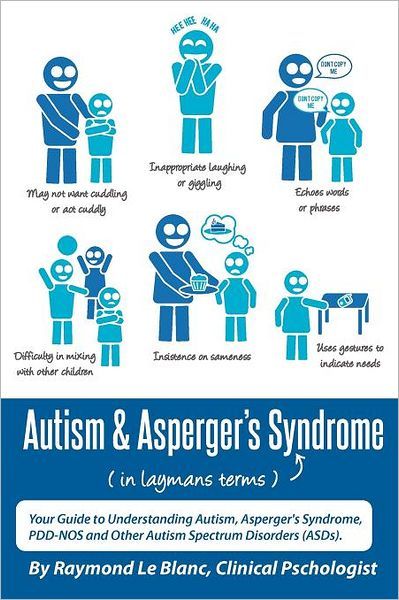 Do you have uncontrollable outbursts of anger if your plans are violated or things don't work out for you?
Do you have uncontrollable outbursts of anger if your plans are violated or things don't work out for you?
No, I have very good control over my emotions.
I can get so angry or hysterical if I had a busy day.
These things happen, I find it difficult to suppress these outbreaks.
Aggression occurs every time something goes wrong.
9. How well can you recognize other people's facial features and emotions?
Very good.
When how.
It's hard enough for me to do this.
I can't recognize other people's emotions and can't remember faces.
10. Do you have a job or did you have one in the past?
Yes, I have a job that involves at least some contact with other people. Or I'm still a student/actively looking for a job.
Yes, but my job doesn't involve much interaction with people.
I had/have a remote job. Or it is a part-time job with minimal social contact. I chose her because I find it difficult to interact with other people.
No, I've never had a job and I'm over 27.
11. Do your days and routines look a lot alike?
No, I have a very varied life.
It happens in different ways - sometimes stagnation, sometimes changes.
Yes, it's hard for me to include something new in my schedule.
They are almost identical and even the smallest changes scare me.
12. Do you have problems with social adaptation? When did they start?
I have no such problems at all.
I have a slight anxiety when I get into unfamiliar situations, but it does not really interfere with my life. It appeared more in adulthood.
I have tangible problems with being around people, whether they started in adolescence or later.
I have a huge social adjustment problem. As far as I remember, I have had them all my life.
13. How easily can you maintain eye contact with the other person?
Easy enough.
If the interlocutor is pleasant, I can look into his eyes for a long time.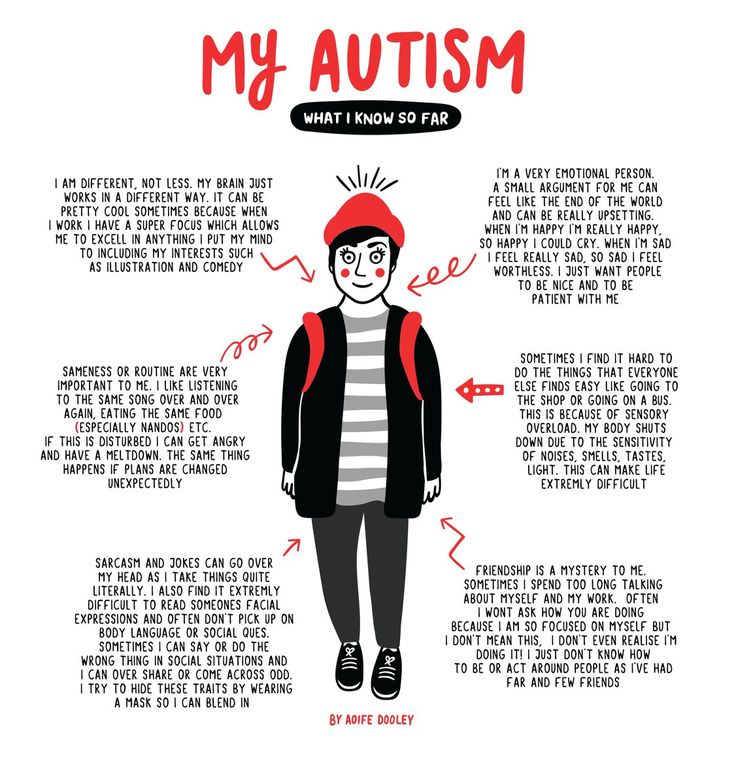 However, with strangers, not everything is so easy.
However, with strangers, not everything is so easy.
It is very difficult for me to do this, I have to put in a lot of effort.
I can't look other people in the eye at all.
14. Are you attentive to non-essential details or inanimate objects?
No, I don't get hung up on anything at all.
Only in matters that are really important to me.
Yes, I often get hung up on unnecessary trifles and I can't overcome it.
Yes, but only to a few specific details and one or two items. For everything else, I don’t react at all and I can’t concentrate.
15. Have you been diagnosed with autism by psychotherapists or psychiatrists?
No, I have never visited a psychologist because I have no complaints.
No, I have never had an appointment with such specialists, because I did not have such an opportunity.
No, but I've been diagnosed with social anxiety, social phobia.
Yes, I have been diagnosed with this before.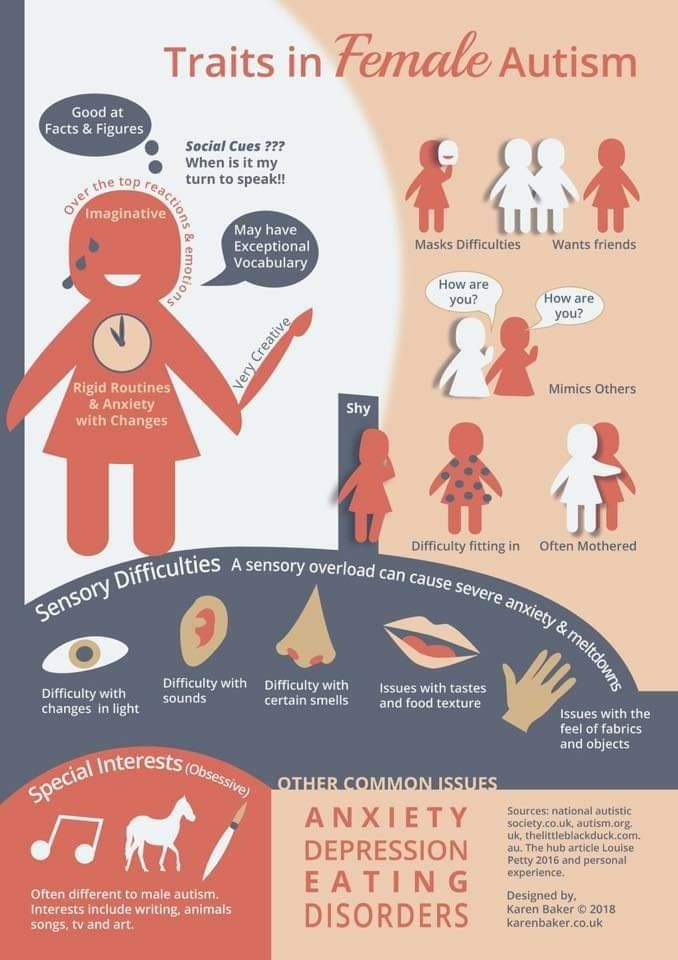
16. Can you say that you have many interests or that they are diverse?
Yes, I have many hobbies and they are not alike (reading and dancing or needlework and volunteering, for example).
I don't have many interests, but they are more or less varied.
I have few interests and they are not related to communication. Sometimes I want to expand their circle, but something seems to interfere with me.
I only have 1-3 hobbies that are completely unrelated to communication, and they are very limited in variety. It's hard for me to try new things.
17. Did you have a speech delay as a child?
No, I spoke in time or even earlier.
I don't know for sure.
I often babbled, but then I started to do it less often, and I learned/learned to talk later than other children.
I spoke much later than my peers.
18. Has it ever happened to you that you almost unconsciously immediately repeated the phrases of people who spoke to you?
No, that certainly didn't happen.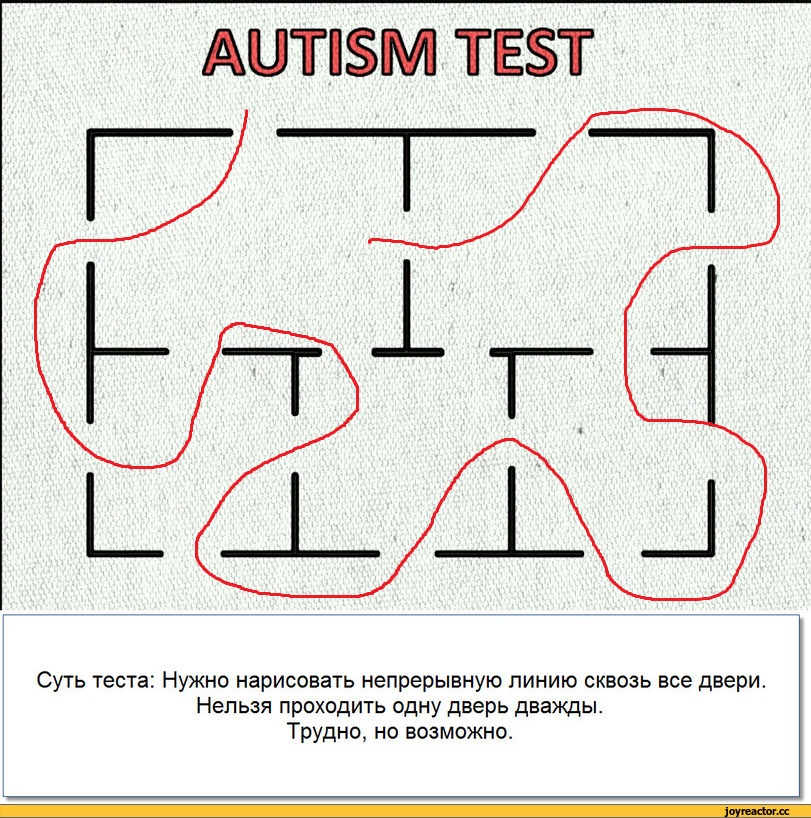
I don't remember it.
There were several times.
It was often, especially in childhood.
19. Why do you want to move away from the outside world, isolate yourself from people?
I don't want to do this at all.
I often want to do this after stressful situations, so I deal with them better.
Solitude is an integral part of me. It is difficult for me to return to normal activities after periods of seclusion.
I am afraid of people, talking to them, unexpected noises, haste, fuss.
20. How often and how willingly do you communicate with people outside your family circle?
Quite often, I am a very sociable person.
Not very often, but simply because I don't want to.
Rarely, I find it difficult to make friends and communicate with strangers.
Never, I avoid any acquaintances and communication outside the home.
Symptoms of autism, online autism test, questions about autism
How to treat a diagnosis?
Diagnosis is a tool to help move from thinking and hypothesizing about the human condition to action. As a general rule, diagnosis is a dynamic concept. And despite the fact that autism remains for life, life with autism can be quite independent under a combination of factors. That is why the diagnosis for specialists, the immediate environment of the family is a good reason to start early work with the child. The diagnosis also helps to clarify the understanding of the child's behavior and the nature of the difficulties that he encounters.
As a general rule, diagnosis is a dynamic concept. And despite the fact that autism remains for life, life with autism can be quite independent under a combination of factors. That is why the diagnosis for specialists, the immediate environment of the family is a good reason to start early work with the child. The diagnosis also helps to clarify the understanding of the child's behavior and the nature of the difficulties that he encounters.
Until the age of three, it is difficult to understand in which area the child's problems lie. How can you help him then?
Thanks to the work of American, Canadian and British specialists, a number of behavioral markers have been developed by now, which, with a high degree of probability, can indicate the risk of autism affecting the development of a child as early as 6 months of age. If the risk of autism in the process of diagnostic work with a child is confirmed, then it is better to start work as if it were autism. This is important, because at the first stage, in any case, communication problems will be solved.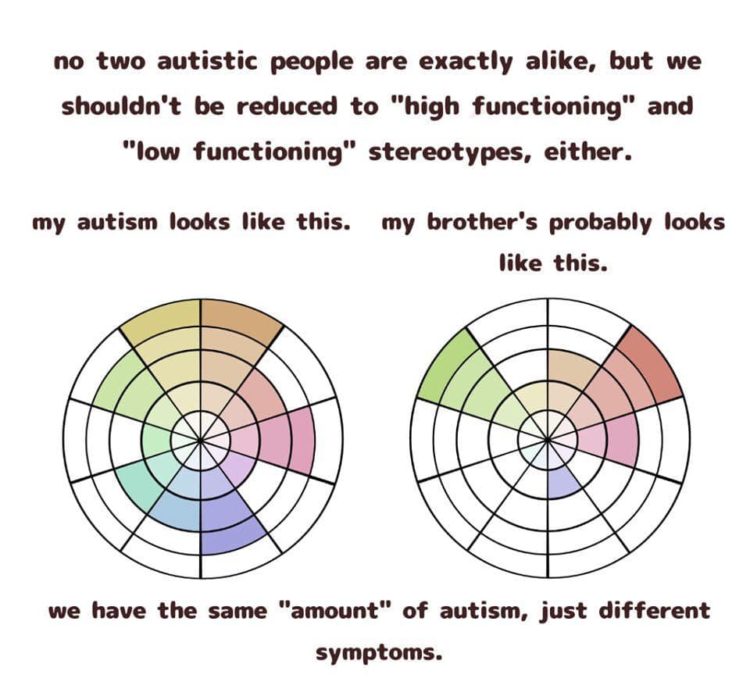 In the future, if autism is not confirmed, then a specialist in the profile of specified problems can easily deal with the child, and the special classes done will only benefit this task. If later autism is confirmed, then early work with the child will increase the chance of his independent and independent adult life.
In the future, if autism is not confirmed, then a specialist in the profile of specified problems can easily deal with the child, and the special classes done will only benefit this task. If later autism is confirmed, then early work with the child will increase the chance of his independent and independent adult life.
Why is it better not to delay contacting specialists and start working as early as possible?
First, because the psyche of any person develops due to information coming from outside, and autism blocks the flow of complete adequate information about the environment. With the normal development of the child, nothing needs to be taught purposefully, everything starts by nature itself: the child coos, babbles, turns, singles out loved ones, imitates, plays, jokes. With autism, all this must be specially taught, otherwise the potentially safe areas of the child's development may remain unsuitable for his independent life. In other words, the sooner the impact of autism on a child's development is mitigated, the better.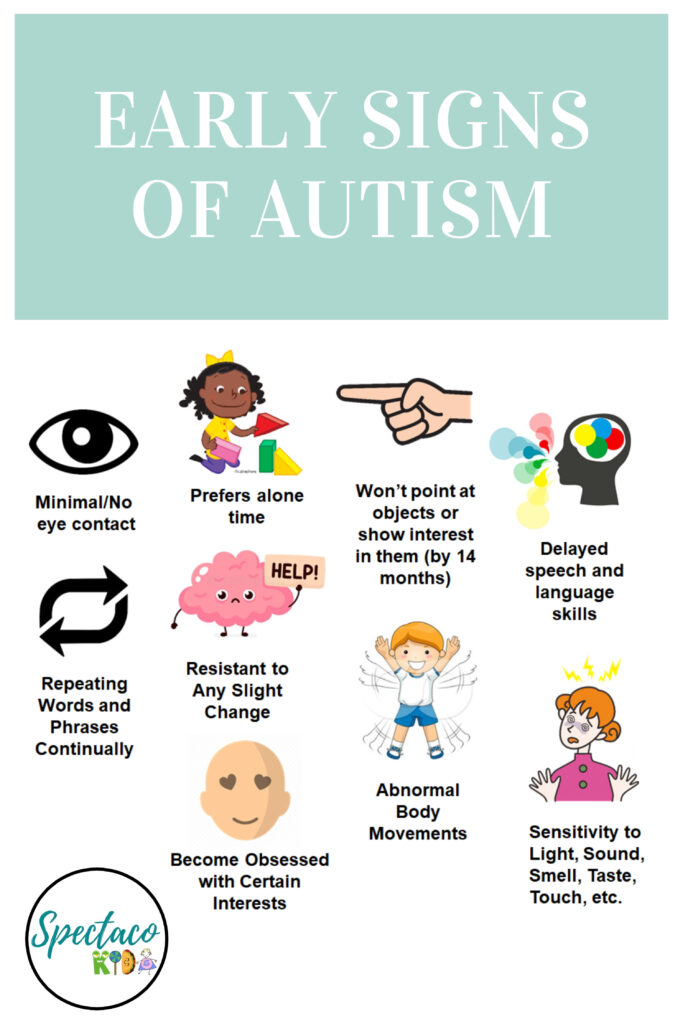
Secondly, at an early age, the child's psyche has such properties as flexibility and plasticity. This allows you to make learning the most successful and effective.
What guides you in choosing a place to study?
-
avoid offers related to "complete cure" for autism
-
decisions about pharmacotherapy, drug support for the child are made only by an experienced child psychiatrist who examined the child (saw him in person!)
-
when working with children with autism, individualized care is very important - a specialist should first study your child, your difficulties, and then suggest ways to work with him
-
be careful about new or experimental methods of correction and treatment, rely on scientifically -reasonable approaches
-
as a parent, you know your child best, which means that you are the "right hand" for specialists and are directly involved in the correctional process
What is the role of the immediate environment? What can grandma, grandpa, other relatives do?
In matters of applying for assistance, the right to represent the interests of the child lies with his legal representatives.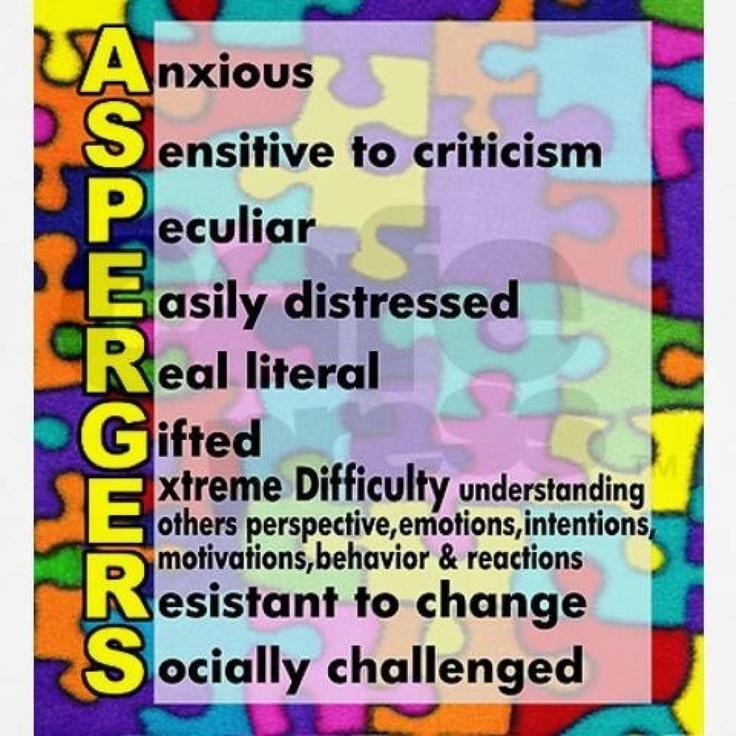 As a rule, these are the parents of the child. Sometimes it can be other relatives of the child or guardians. In this case, there must be relevant documents that confirm the right of legal representation. When contacting our Center, an agreement is concluded with the legal representative of the child. This is the legal side of the issue.
As a rule, these are the parents of the child. Sometimes it can be other relatives of the child or guardians. In this case, there must be relevant documents that confirm the right of legal representation. When contacting our Center, an agreement is concluded with the legal representative of the child. This is the legal side of the issue.
At the same time, apart from legal issues, the role of the immediate environment is very large. First of all, the support of the parents of the child himself, who have to work ten times more, while it seems to others that they work ten times less, is extremely important. At the stage of voicing a diagnosis or the risk of a diagnosis, as a rule, any family feels confusion, resentment, fear, "doom", guilt, and really needs support. The decision on what to do next may be delayed, not taken, due to the fact that the family does not feel that it can cope with the challenge, does not find places where it would receive help, does not want to believe that the child has difficulties. Love, understanding and care on the part of relatives can give an additional resource to parents and help them believe in their abilities. Acting as a "big family", consistently following the recommendations of specialists, one can achieve much greater success in working with a child than one by one.
Love, understanding and care on the part of relatives can give an additional resource to parents and help them believe in their abilities. Acting as a "big family", consistently following the recommendations of specialists, one can achieve much greater success in working with a child than one by one.
What is the forecast?
Autism is currently incurable. The issue is the quality of adulthood. In this regard, the prognosis can vary greatly: from an independent and independent life in society with little support as needed to complete dependence on the constant accompaniment and direct assistance of other people in the performance of daily activities. The prognosis is influenced by many factors: the severity and depth of disorders, the age at which the intervention began, its complex nature, sufficient volume and duration, the correct choice of the main and auxiliary methods, close cooperation between specialists and the family.
Due to the many factors that affect the prognosis, we recommend that when working with children with autism, set specific small goals for the next 4-6 months and achieve them while being "here and now".